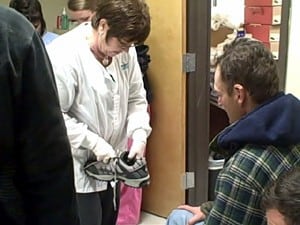UAMS Department of Orthopaedics Reaches out to Homeless
Dec. 1, 2009 | Getting a new pair of shoes is a luxury for many people. But for others it’s a necessity. That’s where the University of Arkansas for Medical Sciences (UAMS) comes in. For the second year, doctors, nurses and volunteers from the UAMS Department of Orthopaedics provided foot exams, along with new shoes and socks, for homeless people in central Arkansas. “It’s something we can do to help them get back to work and improve their daily lives,” said Ruth Thomas, M.D., orthopaedic surgeon. A veteran of medical mission work around the world, Thomas took on the task of coordinating the now-annual event last year when contacted by orthopaedic foot and ankle surgeon Stephen Conti, M.D., of Pittsburgh, who was looking for someone to spearhead a program in Arkansas. Conti’s teenage children, Matthew and Laura, founded the national organization Our Hearts to Your Soles in 2004 to coordinate shoe giveaways and foot exams for homeless people across the country. Our Hearts to Your Soles works in partnership with Soles4Souls, an international charity that collects and distributes new and gently worn shoes to needy people around the world. Soles4Souls has given away more than 3.4 million pairs of shoes internationally, including more than 1 million to victims of the Asian tsunami and Hurricanes Katrina and Rita. Former UAMS employee Sherry Holt worked with the staff of River City Ministry in North Little Rock to organize a foot care clinic and shoe fitting Nov. 19. Two hundred pairs of durable shoes were donated by Red Wing, and socks were provided by Snell Prosthetic & Orthotic Laboratory. In addition to Thomas, four additional UAMS orthopaedic surgeons provided exams and offered recommendations on how to care for the feet. Nurses and technicians trimmed nails and treated calluses, while orthotists measured each person’s feet to ensure they received properly sized shoes. “We hope that having sturdy, well-fit shoes will prevent them from developing other foot problems in the future,” she said. While the main foot-related concerns for homeless people are calluses and fungal infections of the skin and toenails, Thomas and her colleagues were particularly aware of screening for diabetes-related foot problems. “One of the first things we ask each person is if he is diabetic. We look specifically for blisters or rubbing or calluses, because those are things that can lead diabetics eventually to amputations if they’re not appropriately addressed on the front end,” Thomas said. She said the need for continued medical care also was addressed with those who required it. |
